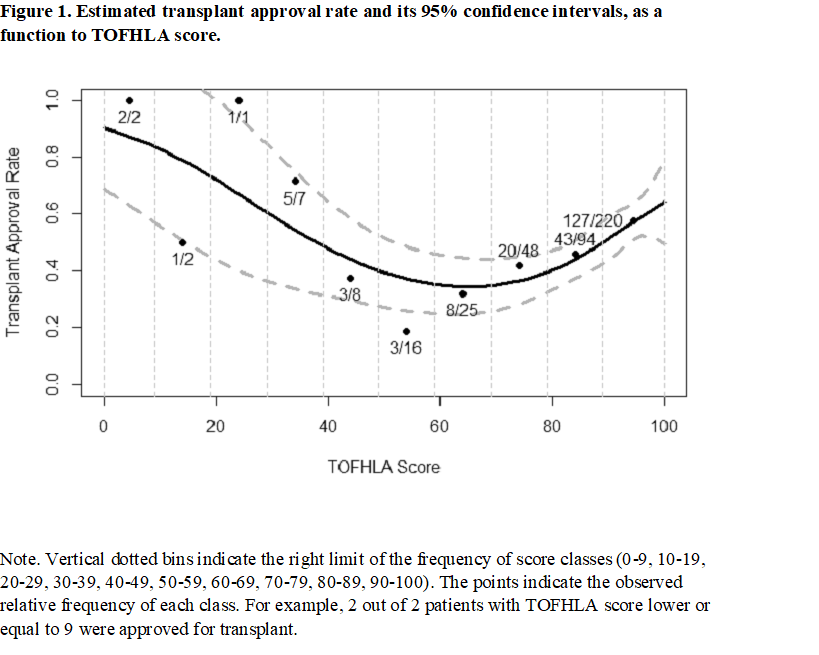The Impact of Health Literacy on Kidney Transplant Listing
G. Chen1, J. Siahaan2, L. Leon Novelo2, I. Rizvi3, A. M. De Golovine4, A. R. Edwards4, A. Pai4, W. A. Dar3
1Abdominal Transplant, Memorial Hermann Hospital, Houston, TX, 2Department of Biostatistics and Data Science, School of Public Health The University of Texas Health Science Center at Houston, Houston, TX, 3Department of Surgery, McGovern Medical School The University of Texas Health Science Center at Houston, Houston, TX, 4Department of Internal Medicine, Renal Diseases and Hypertension, McGovern Medical School The University of Texas Health Science Center at Houston, Houston, TX
Meeting: 2021 American Transplant Congress
Abstract number: 871
Keywords: Kidney transplantation, Psychosocial, Screening
Topic: Clinical Science » Kidney » Kidney Psychosocial
Session Information
Session Name: Kidney Psychosocial
Session Type: Poster Abstract
Session Date & Time: None. Available on demand.
Location: Virtual
*Purpose: Limited health literacy has long been associated with poor health outcomes in the general population, but there have been few studies investigating the association between health literacy and kidney transplant listing. The primary objective of this study was to determine if a patient’s health literacy is associated with transplant listing.
*Methods: We retrospectively reviewed 423 kidney transplant candidates who were prospectively administered the Test of Functional Health Literacy in Adults, a comprehensive numeracy and reading comprehension assessment, during their transplant evaluation. Health literacy scores, demographic, psychosocial, and medical variables were analyzed for correlation value with kidney transplant listing.
*Results: Health literacy scores were found to highly correlate with transplant listing (p=0.003). Unexpectedly, a subset of patients (n=14 out of 36) who had health literacy scores < 59 was still able to obtain approval for listing. The probability of approval decreased when health literacy scores ranged from 0 to 59 and increased when health literacy scores varied between 60 to 100 (Figure 1). Multivariate analysis found transplant listing to also be associated with substance use (OR = 0.15, p < 0.001), ESRD etiology other than diabetes or hypertension (OR = 2.61, p < 0.001), pace of transplant evaluation (p < 0.001), and time on dialysis (p < 0.05). In contrast to other studies, neither race nor annual income were associated with transplant listing.
*Conclusions: Health literacy is associated with kidney transplant listing, however patients with limited literacy are still able to be listed for transplant. The outcomes of this study suggest that health literacy should not be a barrier to listing, but rather an indicator for interventions that can promote access to transplantation. Further exploration on the impact of such interventions is important to reduce disparities in transplantation.
To cite this abstract in AMA style:
Chen G, Siahaan J, Novelo LLeon, Rizvi I, Golovine AMDe, Edwards AR, Pai A, Dar WA. The Impact of Health Literacy on Kidney Transplant Listing [abstract]. Am J Transplant. 2021; 21 (suppl 3). https://atcmeetingabstracts.com/abstract/the-impact-of-health-literacy-on-kidney-transplant-listing/. Accessed February 19, 2026.« Back to 2021 American Transplant Congress

